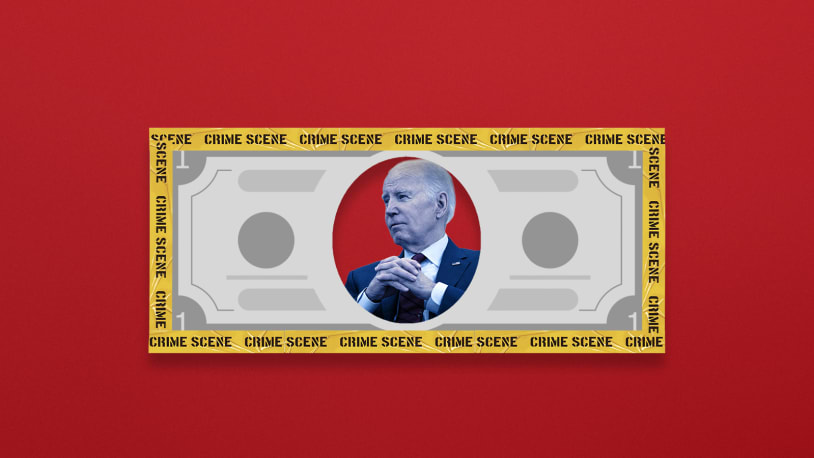
The D.C. crime bill controversy, explained
On Thursday, President Biden announced he would support a GOP-led effort to overturn a recently-passed criminal code reform bill for Washington, D.C., writing that while he supports “D.C. statehood and home rule” he doesn’t support “some of the changes” the city council passed over mayor Muriel Bowser’s objections.
“If the Senate votes to overturn what D.C. Council did,” he promised, “I’ll sign it.”
Predictably, Biden’s contortionist act in service of a Republican legislative push has angered a large swath of his own party, for whom the issue of D.C.’s ability to self-govern has long been a major priority. And that the president had initially opposed efforts to overturn the D.C. Council’s bill has only exacerbated the sense from some Democrats that his decision is a sign of ideological inconsistency in the service of political expediency.
At the heart of all this is the “Revised Criminal Code Act of 2022” — a years-in-the-making bill that updates the District’s criminal code for the first time since it was chartered in 1901. In November, the D.C. Council unanimously approved the revised code, only to have Mayor Bowser veto the act two months later on the grounds that certain reforms would overwhelm an already stretched-thin justice system and might “send the wrong message.” That same month, however, the council overrode Bowser’s veto by a 12-1 vote, setting up the Capitol Hill clash in which Biden now finds himself.
Since D.C. remains ultimately governed by Congress, House Republicans — and several dozen Democrats — successfully voted to nix the crime bill, while the bulk of the Democratic minority voted to essentially let it stand, believing at the time that they were following the guidance of the White House and its broad support for D.C. self-governance.
Even before Biden voiced his opposition to the revision, the measure to kill the act looked set to pass the Senate, with moderate Sen. Joe Manchin (D-W.Va.) pledging to side with Republicans. Now, by announcing his intent to sign the GOP-led bill, Biden has ostensibly given other centrist Democrats the political coverage to join with the right and enact their national legislative will over the objections of D.C. residents themselves — including Bowser, who, despite her opposition to the substance of the act, has petitioned Congress to let the law stand on the grounds of “basic democratic principles of self-determination and local control.”
I call on all senators who share a commitment to the basic democratic principles of self-determination and local control to vote “NO” on any disapproval resolutions involving duly enacted laws of the District of Columbia. pic.twitter.com/QG29opBF0m
— Mayor Muriel Bowser (@MayorBowser) February 23, 2023
Democrats aren’t happy
“I think it is all political,” Congresswoman Eleanor Holmes Norton (D), who represents D.C. in Congress, told Politico after Biden’s announcement. “It comes at a time when crime is going up around the country. I had hoped that [Biden] would stick to where he usually has been, which is to support home rule, whatever the District says. But this issue stands out because it affects so many members.”
“A lot of us who are allies voted no in order to support what the White House wanted,” one unnamed House Democrat told The Hill. “Now we are being hung out to dry. F****** (sic) AMATEUR HOUR. HEADS SHOULD ROLL OVER AT THE WHITE HOUSE OVER THIS.”
Local D.C. officials have also spoken out against Biden’s announcement. Attorney General Brian Schwalb said efforts to nix the law “[degrade] the right of [D.C.’s] nearly 700,000 residents and elected officials to self-govern — a right that almost every other American has,” while Councilmember Charles Allen noted that “until the nearly 700,000 residents of D.C. have full statehood and autonomy, we will be seen and treated as a colony, even by those who purport to support us.”
“These issues should not be decided by us for the D.C. people,” Sen. Mazie Hirono (D-Hawaii) told NPR. “They should have their own representatives doing that.”
The bigger picture?
Ultimately, Biden’s decision to backtrack means he believes the GOP-forged criticism that crime “is a serious vulnerability for Democrats,” Politico‘s Ryan Lizza, Rachael Bade, and Eugene Daniels concluded. “[He believes] his party should insulate itself, even if that means violating a core principle about self-governance.”
“Biden could be looking ahead to 2024, although he hasn’t officially announced his plans to seek reelection,” The Hill‘s Brett Samuels and Alex Gangitano concurred. “A veto would undoubtedly be used by the GOP in campaign ads and arguments for the rest of the cycle as Republicans push out the rhetoric that Democrats are too soft on crime.”
Meanwhile, the high-profile debate over the bill has once again pushed the broader issue of statehood into the national spotlight. In a letter to The Wall Street Journal opinion section following an editorial denouncing the District’s municipal legislation, Mayor Bowser wrote bluntly that “if the sanity of a jurisdiction’s local laws were the measure of whether statehood should be granted, I’m not sure we’d have any states at all. A quick internet search unearths hundreds of local laws that might seem crazy to you or me.”
“But, frankly, it’s none of my business or yours,” she concluded. “That’s the whole point of our representative government. We, the people, get to decide.”
On Thursday, President Biden announced he would support a GOP-led effort to overturn a recently-passed criminal code reform bill for Washington, D.C., writing that while he supports “D.C. statehood and home rule” he doesn’t support “some of the changes” the city council passed over mayor Muriel Bowser’s objections. “If the Senate votes to overturn what…
On Thursday, President Biden announced he would support a GOP-led effort to overturn a recently-passed criminal code reform bill for Washington, D.C., writing that while he supports “D.C. statehood and home rule” he doesn’t support “some of the changes” the city council passed over mayor Muriel Bowser’s objections. “If the Senate votes to overturn what…